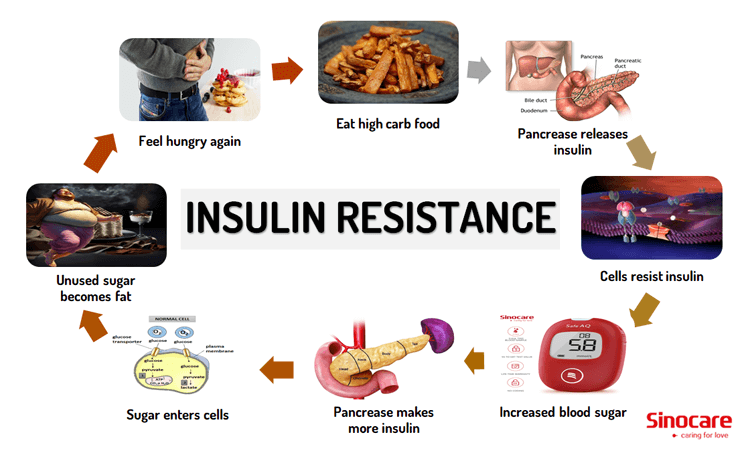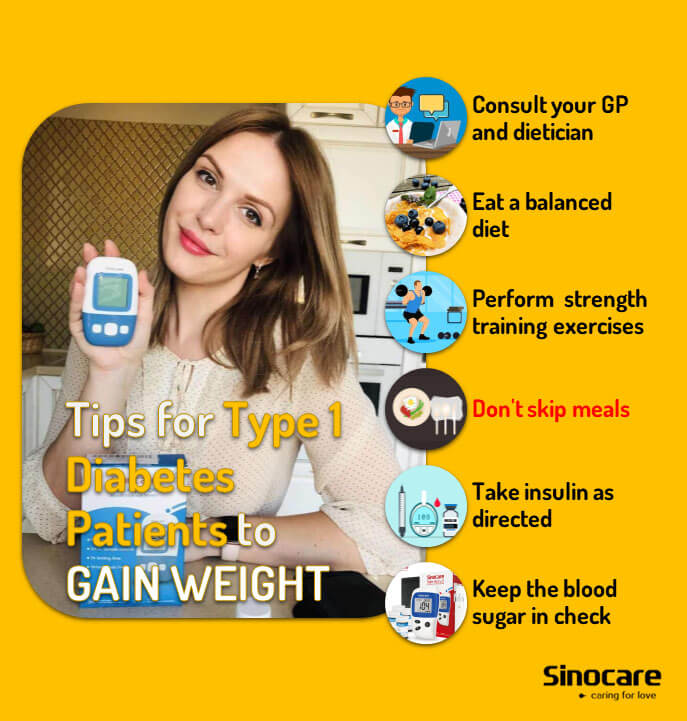People with type 1 diabetes (T1D) may find it hard to add extra kilos due to their condition. Diabetes affects the body’s ability to produce and use insulin, so some may have unintentional weight loss. [1]
But it is not that those with T1D cannot gain weight. With the right strategies, they can add some extra pounds while keeping their blood sugars in check. [1, 2]
In this article, we’ll explore why some T1D patients lose weight and how they can regain those pounds.
Why do Some T1D Diabetics Suffer Weight Loss?
Weight loss is a common symptom of T1D, especially in newly diagnosed patients. These people may shed pounds unintentionally for several reasons.
However, if one had to pinpoint a single cause for weight loss in T1D patients, it would be insulin resistance. It is a condition in which the cells become less responsive to insulin and unable to absorb blood sugar readily. [3]

This weak response of cells causes the pancreas to produce more insulin. The blood sugar levels will remain within the normal range until the pancreas keeps making more insulin. But once it stops producing enough insulin, the cells will lose their ability to take up glucose from the blood.
When glucose cannot enter the cells, the body will start breaking down fat and muscle for energy. Over time, this fat-burning process can lead to unintended weight loss.
And if the blood glucose level stays too high for too long, the cells may run out of fuel. The body will also excrete excess glucose in the urine, which may result in dehydration and weight loss. This lack of energy reserve may cause a life-threatening health complication called diabetic ketoacidosis (high levels of acid in the blood). [3-5]
Additionally, skipping meals or not eating enough calories can cause people with T1D to lose weight. A lack of appetite can be a reason for their weight loss, making it difficult for them to consume enough calories to maintain a healthy weight. [1, 2]
Is It Hard to Gain Weight with Type 1 Diabetes?
Yes, having T1D can make it difficult to gain weight. But it is possible to add some extra pounds!
Those with T1D need to take a different strategy to gain extra pounds.
First of all, they should limit their intake of sugar and carbs. Because the pancreas fails to make enough insulin, their bodies react by affecting how the cells store and use calories. So they should keep their blood glucose levels within the normal range to avoid further weight loss. [1, 6]
People with T1D should talk to their GPs or a dietician to get a diet plan tailored to their needs. They need to adopt a balanced diet that includes plenty of nutrient-dense foods. This personalized diet plan can supply the body with the vital nutrients it needs to gain weight while keeping the blood sugar in check.
T1D patients should exercise regularly to manage their blood sugar levels and maintain a healthy weight. Light exercise like walking, jogging, or yoga can help stimulate their hunger hormones.
Regular exercise also boosts immunity and protects against many chronic illnesses, such as:
- Type 2 diabetes
- Cardiovascular diseases
- Certain types of cancer
- Alzheimer’s disease and other critical conditions
However, excess exercise can cause a dip in blood sugar levels, so don’t overdo it.

Eating Advice to Gain Weight with T1D
T1D patients should follow a simple rule to gain weight: eat more calories than the body burns. However, it is equally significant for them to adopt a nutrient-rich, balanced diet that will not cause a sudden spike or dip in blood sugar. [7]
Here are some eating advice to put on weight with T1D:
- Eat more frequently. Avoid three large meals a day. Divide the meals into 5-6 smaller ones throughout the day. Include a balance of carbohydrates, protein, and fats at each meal. This eating habit can help T1D patients to eat more calories without bingeing. [8]
- Focus on nutrient-rich foods. Choose foods high in calories, protein, and healthy fats. Examples include whole grains, dairy products, lean meats, nuts, seeds, avocados, and olive oil.
- Monitor carbohydrate intake. Carbohydrates are the primary source of glucose in the body. T1D patients should consume at least 130 grams of carbohydrates a day. Choose complex carbohydrates like fruits, vegetables, and whole grains that will not cause a sudden spike in blood sugar levels.
- Include protein at each meal. Proteins serve as the building blocks of our bodies. Eating proteins, such as chicken, fish, and lean meats, can help prevent muscle loss and promote weight gain. [7]
Exercising Advice to Gain Weight with T1D
Regular exercise is essential for the overall health and well-being of everyone. It can also help people with T1D gain weight by increasing muscle mass and controlling blood sugar levels. [9, 10]
Here are some exercising tips for people with T1D who want to gain weight:
- Focus on resistance training. Exercises for building muscle and gaining weight include squats, deadlifts, lunges, weightlifting, and push-ups. [10]
- Perform cardiovascular exercise. Cardiovascular exercises like walking, cycling, or running can help gain weight by lowering blood sugar and boosting overall health. [11]
- Avoid over-exercising. Over-exercising can lead to weight loss, so it is essential to balance exercise with calorie intake. [9, 12]
- Monitor blood sugar levels. Patients with T1D may experience a sudden drop in blood sugar levels after exercise. So they should monitor their blood glucose levels before and after exercise to avoid this. And if necessary, they should modify their insulin dosage and food intake. [12]
Things to Avoid
While a balanced diet and regular exercise can help T1D patients gain weight, they should avoid certain things to support their goals, such as:
- Processed and fried foods: These foods may cause weight gain but are high in unhealthy fats, which can do more harm to the body than good. [13]
- Sugary drinks: T1D patients should avoid beverages like soda, fruit juice, syrups, energy drinks, and sweetened waters due to their high sugar content. [14]
- Alcoholic drinks: Alcohol badly affects how insulin metabolizes glucose, so people with diabetes should limit their intake of alcoholic beverages. [15]
- Skipping meals: T1D patients should avoid skipping meals. They should eat smaller meals throughout the day to maintain a healthy metabolism and provide the body with the energy it needs to build muscle. [1, 2]
- Cardio overuse: Exercises like running and cycling are great for our hearts but burn too many calories. So T1D patients should focus more on strength training exercises to gain weight. [12]
- Not adjusting insulin dosage: People with T1D must adjust their insulin doses based on their weight-gain goals. If necessary, they should discuss changing their insulin regimen with their doctors. [3, 4]
Frequently Asked Questions (FAQs)
Does Insulin Make Me Lose Weight?
No, those who take insulin may have the opposite effect, i.e., weight gain. Insulin regulates how our bodies absorb glucose from the blood. When T1D patients start insulin therapy, sugar in the bloodstream enters the cells. If they eat more calories than they need, the unused sugars in cells will become fats. When these fats build up, they will gain extra pounds. However, insulin overdose can cause low blood sugar and unintended weight loss. [3-5]
Does Glucerna/Ensure Help me Gain Weight?
No, formulas like Glucerna and Ensure aim to control blood sugar and manage body weight. As of now, no studies support their link with weight gain. Both products provide a nutritional balance for those who struggle to get enough nutrition from regular food.
Can I Eat Fat to Gain Weight?
Yes, but if it is part of a balanced diet. And one should allow only healthy fats like avocado, nut butter, eggs, and olive oil. These fats can provide extra calories and nutrients a diabetic patient needs to add extra pounds.
Final Thoughts
Gaining extra pounds with T1D is challenging but possible. One needs to have proper strategies and mindset for that.
In brief, T1D patients should work with a doctor and a dietitian to get a diet plan specific to their needs. They should also focus on eating nutrient-rich foods, doing strength training, adjusting insulin doses as needed, and keeping blood sugar in check.
Keeping these things in mind can help them live healthy, happy lives while staying within the normal range of BMI values.
References
- Mottalib A, Kasetty M, Mar JY, Elseaidy T, Ashrafzadeh S, Hamdy O. Weight management in patients with type 1 diabetes and obesity. Current diabetes reports. 2017 Oct;17:1-9.
- Vilarrasa N, San Jose P, Rubio MÁ, Lecube A. Obesity in patients with type 1 diabetes: links, risks and management challenges. Diabetes, Metabolic Syndrome and Obesity: Targets and Therapy. 2021 Jun 21:2807-27.
- Freeman AM, Pennings N. Insulin resistance. InStatPearls [Internet] 2022 Jul 4. StatPearls Publishing.
- Cleland SJ, Fisher BM, Colhoun HM, Sattar N, Petrie JR. Insulin resistance in type 1 diabetes: what is ‘double diabetes’ and what are the risks? Diabetologia. 2013 Jul;56:1462-70.
- Abd El-Kader SM, Al-Jiffri OH. Impact of weight reduction on insulin resistance, adhesive molecules and adipokines dysregulation among obese type 2 diabetic patients. African health sciences. 2018 Nov 29;18(4):873-83.
- Van der Schueren B, Ellis D, Faradji RN, Al-Ozairi E, Rosen J, Mathieu C. Obesity in people living with type 1 diabetes. The Lancet Diabetes & Endocrinology. 2021 Nov 1;9(11):776-85.
- Dikeman DT, Westman EC. Carbohydrate-restricted diets and Type 1 diabetes mellitus: research considerations. Current Opinion in Endocrinology & Diabetes and Obesity. 2021 Oct 1;28(5):437-40.
- Driscoll KA, Corbin KD, Maahs DM, Pratley R, Bishop FK, Kahkoska A, Hood KK, Mayer-Davis E. Biopsychosocial aspects of weight management in type 1 diabetes: a review and next steps. Current diabetes reports. 2017 Aug;17:1-9.
- Lu X, Zhao C. Exercise and type 1 diabetes. Physical Exercise for Human Health. 2020:107-21.
- Turner D, Luzio S, Gray BJ, Dunseath G, Rees ED, Kilduff LP, Campbell MD, West DJ, Bain SC, Bracken RM. Impact of single and multiple sets of resistance exercise in type 1 diabetes. Scandinavian journal of medicine & science in sports. 2015 Feb;25(1):e99-109.
- Wu N, Bredin SS, Guan Y, Dickinson K, Kim DD, Chua Z, Kaufman K, Warburton DE. Cardiovascular health benefits of exercise training in persons living with type 1 diabetes: a systematic review and meta-analysis. Journal of clinical medicine. 2019 Feb 17;8(2):253.
- Cockcroft EJ, Narendran P, Andrews RC. Exercise‐induced hypoglycaemia in type 1 diabetes. Experimental physiology. 2020 Apr;105(4):590-9.
- Virtanen SM. Dietary factors in the development of type 1 diabetes. Pediatric diabetes. 2016 Jul;17:49-55.
- Lamb MM, Frederiksen B, Seifert JA, Kroehl M, Rewers M, Norris JM. Sugar intake is associated with progression from islet autoimmunity to type 1 diabetes: the Diabetes Autoimmunity Study in the Young. Diabetologia. 2015 Sep;58:2027-34.
- Alessi SM, Foster NC, Rash CJ, Van Name MA, Tamborlane WV, Cengiz E, Polsky S, Wagner J. Alcohol use and clinical outcomes in adults in the type 1 diabetes exchange. Canadian Journal of Diabetes. 2020 Aug 1;44(6):501-6.


